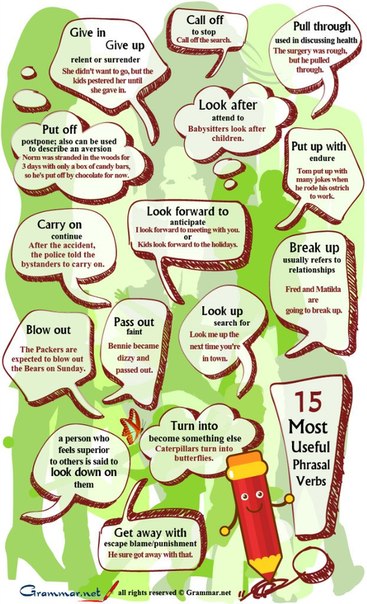
1. “Call off”: to stop–”call off the search”–and used when phoning in to work. “I called off today because I’m sick.”
2. “Look up”: search for. “I’ll go online and look up ‘phrasal verbs’.” “Look me up the next time you’re in town.”
3. “Get away with”: escape blame/punishment. “He sure got away with that”, or “the crook got away with 50 dollars”.
4. “Pull through”: used in discussing health–”The surgery was rough, but he pulled through”, or “the victim of the chicken attack pulled through with no lingering injuries”.
5. “Break up”: usually refers to relationships–”Fred and Matilda are going to break up”–but variations can be used to show an emotional state. “When Matilda dumped Fred, he was pretty broken up about it.”
6. “Blow out”: a tire flattens while driving–”Mel had a blowout on the way to work”–and it indicates a lopsided sports score. “It was a blowout; the Packers beat the Bears 24 to 3.” It is also used to indicate anger: “Ed broke Bob’s window, and Bob had a complete blowout when he saw it”.
7. “Give in/give up”: relent or surrender. “She didn’t want to go, but the kids pestered her until she gave in.” “The robber gave up when the cops cornered him.”
8. “Put up with”: endure, such as “Tom put up with many jokes when he rode his ostrich to work”.
9. “Look down on”: a person who feels superior to others is said to “look down on” them. “Dog owners sometimes look down on cat owners, which is silly, because cat owners sometimes look down on dog owners.”
10. “Turn into”: become something else–”caterpillars turn into butterflies”. It is also used in driving: “after you pass the park, turn into the school parking lot”.
11. “Carry on”: continue. “After the accident, the police told the bystanders to carry on.” It is also a rant–”when she spilled her milk, she carried on about it for hours”.
12. “Look after”: attend to–”babysitters look after children”, or “please look after that task I gave you”.
13. “Pass out”: faint–”Bennie became dizzy and passed out”–or “to give”: “Frankie passed out newspapers”.
14. “Put off”: postpone. “He put off painting and cut the grass first.” It is also used to describe an aversion: “Norm was stranded in the woods for 3 days with only a box of candy bars, so he’s put off by chocolate for now”.
15. “Look forward to”: anticipate. “I look forward to meeting with you,” or “kids look forward to the holidays”.
This list is small–there are plenty of others used every day, and they are one of the most creative aspects of English. Phrasal verbs lists shrink and grow over the years as the language evolves. Some are rather amusing, and it is interesting to speculate on how they came to be.